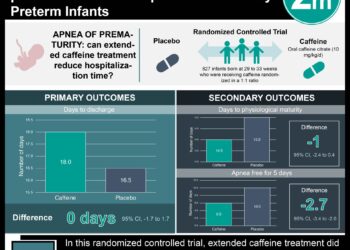High dose erythropoietin may not be efficacious for neuroprotection in extremely preterm infants
1. In this randomized controlled trial involving extremely preterm infants, high dose erythropoietin did not reduce the risk of death or severe neurodevelopmental impairment at two years of age versus placebo.
2. This finding contradicts the results of previous studies involving different dosing regimens and more mature babies.
Evidence Rating Level: 1 (Excellent)
Study Rundown: While advances in care have dramatically improved survival, preterm infants remain at high risk of functional and cognitive impairment. Erythropoietin is an erythropoietic agent that has also been shown to have neuroprotective effects in preclinical models and a meta-analysis of four randomized controlled trials. This placebo-controlled, double-blind trial was conducted to evaluate whether these benefits extended to extremely preterm infants, finding that there was no difference between groups in the primary outcome of death or severe neurodevelopmental impairment. Serious adverse events and common complications of prematurity occurred at similar rates in both groups. These results indicate the possibility that erythropoiesis-stimulating agents do indeed inhibit neurologic dysfunction but with a magnitude of effect that is overshadowed by the numerous unresponsive pathways in the most premature infants. While this study had a larger sample size than previous studies, it was limited by its reliance on testing at 2 years, as assessments at older ages are much more accurate predictors of neurodevelopmental outcomes. Another limitation was that infants with poorer prognoses who may have benefited the most from treatment were excluded from participation.
Click here to read the study in NEJM
Relevant Reading: Long-term neuroprotective effect of erythropoietin on executive functions in very preterm children (EpoKids): protocol of a prospective follow-up study
In-Depth [randomized controlled trial]: In this multicenter, double-blind trial, 941 infants who were born at 24 weeks 0 days to 27 weeks 6 days of gestation were randomly assigned to receive erythropoietin or placebo within 24 hours after birth. Exclusion criteria were life-threatening anomalies, chromosomal anomalies, disseminated intravascular coagulopathy, twin-to-twin transfusion, a hematocrit level above 65%, hydrops fetalis, or known congenital infection. In order to quickly achieve neuroprotective serum levels, erythropoietin was initially administered intravenously at a dose of 1000 U/kg every 48 hours for a total of six doses. Following this period, the dosing regimen was modified to 400 U/kg three times per week to maintain a concentration of neurologic and hematologic benefit. Treatment was continued through 32 weeks 6 days of postmenstrual age on the basis of the period of oligodendrocyte vulnerability. In the per-protocol efficacy cohort, the primary outcome of death or severe neurodevelopmental impairment (defined as severe cerebral palsy or a composite motor or composite cognitive score of less than 70 on the Bayley Scales of Infant and Toddler Development, third edition) occurred in 97 of 376 children (26%) in the erythropoietin group and in 94 of 365 (26%) in the placebo group (relative risk, 1.03; 95% CI, 0.81 to 1.32; P=0.80). In the safety cohort, serious adverse events also occurred at similar rates in both groups (relative risk, 1.01; 95% CI, 0.83 to 1.22).
Image: PD
©2020 2 Minute Medicine, Inc. All rights reserved. No works may be reproduced without expressed written consent from 2 Minute Medicine, Inc. Inquire about licensing here. No article should be construed as medical advice and is not intended as such by the authors or by 2 Minute Medicine, Inc.









